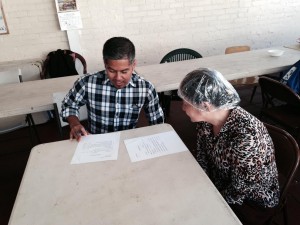
I do not share my problems with strangers.
I can’t bring shame to my family.
How will talking about my fears and pains help me feel better?
These are common statements the clinical staff of Pacific Asian Counseling Services (PACS) hear as they work with clients in Los Angeles County.
“There is a stigma attached to mental illness in America,” said Mariko Kahn, Executive Director of PACS. “But that stigma is often exponentially greater in Asian communities, so we are trying to identify better ways to help this population.”
PACS, which serves people of all ethnicities, provides an array of mental health services designed to be culturally sensitive and linguistically appropriate to respond to the diversity of their clients. Through the years, they’ve been recognized for their expertise with refugee and immigrant Asian Pacific Islander populations, and as a result, received funds from the Mental Health Services Act (MHSA) to explore innovative therapies specifically aimed for the Cambodian community.
PACS selected this Southeast Asian group because of their tremendous need and disparity in accessing care. The Long Beach community is actually home to the largest population of Cambodians outside their home country. Many suffer from the tragedy that unfolded in Cambodia in 1975 when Khmer Rouge took control of the country. Today, the Cambodian community in the U.S. often feels linguistically isolated, and many continue to suffer post-traumatic stress disorder (PTSD).
To assist, PACS launched its Integrated Network for Cambodians (INC) three years ago in Long Beach, and just received renewal for an additional three years of funding given its successful outcomes.
“What we love about this program is that it uses the beliefs and traditions of an ethnic group, combined with western therapeutic practices to help them heal – it’s very innovative,” said Kahn. “This program functions like an actual living laboratory, and we’re learning so much from the unique programs we are testing to help the Cambodian community.”
To date, INC has introduced various religious and spiritual elements to their mental health services work, including acupuncture, a quarterly traditional Buddhist blessing ceremony, monthly cooking classes held in the sacred space of the temple, and meditation. Acknowledging and including spirituality in the healing process is key for Cambodians because it influences and permeates all aspects of daily life.
“We’ve listened to our clients as we’ve developed these services,” said Eria Myers, program coordinator for INC. “They’ve provided the inspiration, and as a result, we are seeing great success and openness to heal.”
In the case of the blessing ceremonies, INC staff arrange for clients visit a local temple to honor their ancestors who passed away as a means to receive a blessing to relieve bad karma from previous lives.
“They believe their current suffering could be linked to bad things they’ve done in previous lives,” said Myers. “So after the blessing ceremony, they leave feeling happier and calmer.”
Research revealed many Cambodian clients felt that the trauma inflicted upon them by the Khmer Rouge is a result of past karma. Being in a blessing ceremony is significant in the healing process because it is a way to balance the disharmony in their lives.
With the cooking classes, clients join together as one of the clients leads a session to teach the others how to make a traditional Cambodian dish. The sessions have been shown to build self-esteem, and transfer wisdom to younger generations. Also the tradition of feeding the monks with the dishes prepared by them bestows blessings on the clients and their families.
While INC directly serves 50-60 clients annually with mental health services, their community partners provide outreach, engagement and education to hundreds of community residents about emotional distress, access to medical services and substance abuse treatment.
To be enrolled as a client of INC, an individual must meet the medical necessity criteria for specialty mental health services and have a chronic medical condition and/or a substance abuse issue. Counseling services and substance abuse treatment is offered at no cost to the client. For medical treatment, clients are seen at low cost to no cost depending on which program they are eligible for at PACS’ partner, The Children’s Clinic.
As INC enters its three-year extension, Myers said one of the goals is to find more effective and creative ways to outreach to Cambodian children and adolescents so they can also benefit from receiving integrated mental health and physical health care services.
“We’re on the right track,” said Myers. “Our results show these innovative approaches are making a difference, and we’re looking forward to supporting more who could benefit from our services.”
To learn more about Pacific Asian Counseling Services, visit http://pacsla.org/
